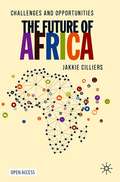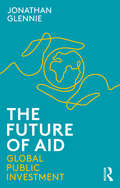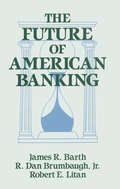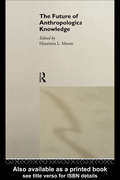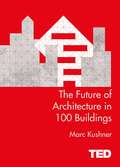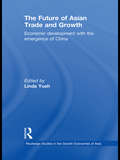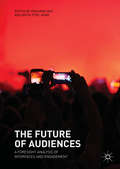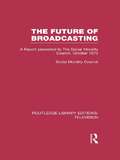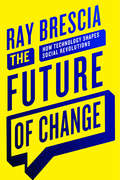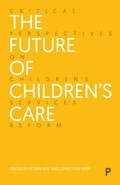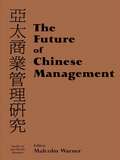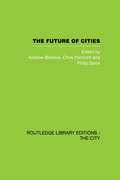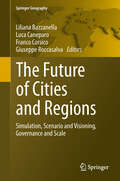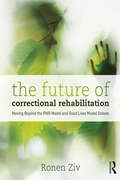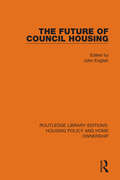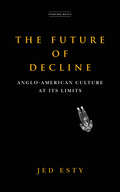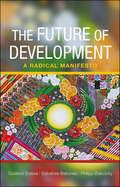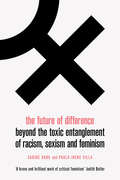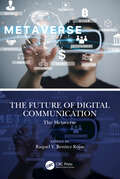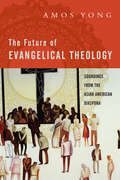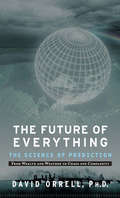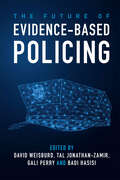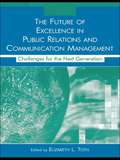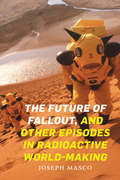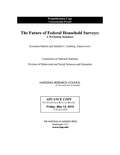- Table View
- List View
The Future of Africa: Challenges and Opportunities
by Jakkie CilliersThis open access textbook offers a critical introduction to human and economic development prospects in Africa revolving around three questions: where is Africa today, what explains the current state, and, given historical trends and what we know about the world, where do we think the continent will be in 2040? And, a final question: what can we do to create a better tomorrow? It models ambitious progress in health, demographics, agriculture, education, industrialization, technological leapfrogging, increased trade, greater stability, better governance and external support. The book reviews the future of work/jobs, poverty and the impact of climate change. A combined Closing the Gap scenario presents a forecast of what could be possible by 2040. Each chapter suggests which policies might accelerate prospects for each sector. Written in an accessible style, and supported by a range of pedagogical features, this textbook introduces undergraduate and graduate students to the contemporary human and economic development prospects in Africa.
The Future of Aid: Global Public Investment
by Jonathan GlennieInternational cooperation has never been more needed, but the current system of “aid” is outdated and ineffective. The Future of Aid calls for a wholesale restructuring of the aid project, a totally new approach fit for the challenges of the 21st century: Global Public Investment. Across the world, billions of people are struggling to get by in unequal and unsustainable societies, and international public finance, which should be part of the answer, is woefully deficient. Engagingly written by a well-known expert in the field, The Future of Aid calls for a series of paradigm shifts. From a narrow focus on poverty to a broader attack on inequality and sustainability. From seeing international public money as a temporary last resort, to valuing it as a permanent force for good. From North-South transfers to a collective effort, with all paying in and all benefitting. From outdated post-colonial institutions to representative decision-making. From the othering and patronising language of “foreign aid”, to the empowering concept of Global Public Investment. Ten years ago, in The Trouble with Aid, Jonathan Glennie highlighted the dangers of aid dependency and the importance of looking beyond aid. Now he calls for a revolution in the way that we think about the role of public money to back up our ambitious global objectives. In the wake of the COVID-19 crisis, it is time for a new era of internationalism.
The Future of American Banking (Columbia University Seminars Ser.)
by James R. Barth Robert E. Litan R.Dan BrumbaughThe future of American banking is in doubt and the industry and the federal insurance fund that helps support it are in turmoil. The ingredients of the turmoil have been simmering in public view since at least the early 1980s when commercial bank loans to lesser developed countries (LDCs) began to default. The difficulties began to boil at the end of the decade when the prospect first arose that the banks' deposit insurer, the Bank Insurance Fund (BIF) that is administered by the Federal Deposit Insurance Corporation (FDIC), might require dollars to resolve bank failure as occurred in the savings and loan debacle. This book frames the major economic and policy issues raised by the banking crisis whose resolution largely determines the future of American banking. It focuses on the current reported condition of the banking industry, concentrating on large banks in particular. A longer-run economic prognosis for the banking industry is presented and the implications of future bank failures for the financial services sector and federal regulatory policy are discussed. Most importantly the book contains suggestions for changes in the nation's deposit-insurance system and accompanying banking laws. These changes would reduce the federal government's deposit insurance liability and would provide banks with potentially profitable opportunities. The study includes a wealth of data on the financial condition of American banks and the system as a whole, some of it not easily obtainable from any other source. The authors are internationally recognized as knowledgeable experts on the state of the American banking system and the options and prospects for US banking reform.
The Future of Anthropological Knowledge (ASA Decennial Conference Series: The Uses of Knowledge)
by Henrietta L. MooreThe Future of Anthropological Knowledge the chapters explore the question of the nature of social knowledge from a variety of perspectives and locations such as China, Africa, the USA and elsewhere. By examining the changing nature of anthropological knowledge and of the production of that knowledge, this book challenges the notion that only western societies have produced social theories of modernity and of global scope. Knowledge of society can no longer be restricted to a knowledge of face-to-face social relations but must encompass the effect of technology, global consumption patterns and changing geo-political configurations. The Future of Anthropological Knowledge will be of interest to anthropologists and students of culture and society.
The Future of Architecture in 100 Buildings
by Marc KushnerPart of the TED series: The Future of Architecture in 100 BuildingsA pavilion made from paper. An inflatable concert hall. A building that eats smog. A bridge that grows grapes. The Future of Architecture in 100 Buildings captures the soaring confidence, the thoughtful intelligence, the futuristic wonder, and at times the sheer whimsy of the world's most inspired and future-looking buildings. As author Marc Kushner explains, 'The future of architecture is not one of any dominant style, but rather a world of constant innovation and experimentation.' Like an architectural cabinet of wonders, the book captures this glorious global diversity. From soaring steel towers to bamboo bungalows; from iconic monuments to ingenious children's playgrounds, each page offers an unexpected glimpse of architecture's potential. Through his book and TEDTalk, Kushner suggests that in the age of social media, buildings speak louder than ever. Everyone with a smartphone has become an architectural photographer, snapping selfies with the world's most photogenic buildings. And this constant stream of photos ensures that architecture is now in conversation with the world. Its future matters more - and to more of us - than ever. Aimed at this new, broad audience for architecture, this is an essential and delightful guide to the future being built around us.
The Future of Asian Trade and Growth: Economic Development with the Emergence of China (Routledge Studies in the Growth Economies of Asia)
by Linda YuehThis book presents a comprehensive analysis of current trends of trade and economic growth in Asia, assessing how they are likely to develop in the future. It examines the evolving patterns of Asian economic development with the emergence of China, including since China’s accession to the World Trade Organisation (WTO) in 2001. It is written by experts specialising in economic growth and regional and global trade/investment issues, alongside country specialists who have examined the development path of Asian economies. It discusses the significance of a export-oriented growth strategy on the Asian region, and the likely patterns of intra-regional specialisation given China’s rise. The book examines the degree to which the remarkable growth of China is likely to affect other Asian countries in terms of global market share, and growth prospects. The book explores how the rise of intra-industry trade is affecting patterns of specialisation in the region, and appraises the role of multinational corporations and foreign direct investment. Informed by the latest empirical economic thinking, this book is a rigorous examination of the influence of an emerging economic superpower, and the future for economic growth in Asia. Readers interested in the implications of the rise of China, the effect on the economic development path of the most successful developing nations of our time and the lessons to be heeded from China’s integration with the global economy will find this a thorough yet accessible account of the influence of an emerging economic superpower.
The Future of Audiences: A Foresight Analysis Of Interfaces And Engagement
by Brita Ytre-Arne Ranjana DasThis book brings together contributions from scholars across Europe to present findings from a foresight analysis exercise on audiences and audience analysis, looking towards an increasingly datafied world and anticipating the ubiquity of the internet of things. The book uses knowledge emerging out of three foresight exercises, produced in co-operation with more than 50 stake-holding organisations and building on systematic reviews of audience research. It works through these exercises to arrive at a renewed agenda for audience studies within communication scholarship in the context of intrusive and connected interfaces and emerging communicative practices.
The Future of Broadcasting: A Report Presented to the Social Morality Council, October 1973 (Routledge Library Editions: Television)
by Social Morality CouncilAt the time when this book was originally published, broadcasting in Britain had become a huge industry undergoing major changes. There were questions over the release of a new television channel, and commercial radio. This Report was commissioned to aid the citizen at the receiving end of the new technologies who could feel very remote from the plans and decisions. It represents a wide range of views and interests, to examine the important questions which were arising from broadcasting, from the point of view of the public benefit. It sets out clearly and fully the background and the arguments in broadcasting debate. The report made many interesting and far-reaching recommendations, and looking back this reveals a lot about the inner processes of the broadcasting organisations of the time. This is a fascinating glimpse of past questions and solutions in which parellels can be drawn with the present time.
The Future of Change: How Technology Shapes Social Revolutions
by Ray BresciaIn The Future of Change, Ray Brescia identifies a series of "social innovation moments" in American history. Through these moments—during which social movements have embraced advances in communications technologies—he illuminates the complicated, dangerous, innovative, and exciting relationship between these technologies, social movements, and social change. Brescia shows that, almost without fail, developments in how we communicate shape social movements, just as those movements change the very technologies themselves.From the printing press to the television, social movements have leveraged communications technologies to advance change. In this moment of rapidly evolving communications, it's imperative to assess the role that the Internet, mobile devices, and social media can play in promoting social justice. But first we must look to the past, to examples of movements throughout American history that successfully harnessed communications technology, thus facilitating positive social change. Such movements embraced new communications technologies to help organize their communities; to form grassroots networks in order to facilitate face-to-face interactions; and to promote positive, inclusive messaging that stressed their participants' shared dignity and humanity. Using the past as prologue, The Future of Change provides effective lessons in the use of communications technology so that we can have the best communicative tools at our disposal—both now and in the future.
The Future of Children’s Care: Critical Perspectives on Children’s Services Reform
by Robin Sen and Christian Kerr With a foreword by June ThoburnOver the last decade there has been a series of Government policy initiatives in respect of children’s services and social work education in England, many of which aim to de-regulate or privatise aspects of these services. Critically considering the impact of the MacAlister Review, this book explores the past, present and future of children’s services in the UK from a range of perspectives – lived, professional and academic. This accessible guide provides a timely and incisive overview of the current children’s services reform agenda in the UK. It identifies current challenges, analyses both strengths and weaknesses in the current policy agenda and sets out alternative policy and practice directions for a system that can meet families’ needs.
The Future of Chinese Management: Studies in Asia Pacific Business
by Malcolm WarnerThe papers that comprise this study examine the ongoing state of management reforms in the People's Republic of China. The contributors explain how and why these reforms came about and where they are heading.
The Future of Cities
by Chris Hamnett Andrew Blowers Philip SarreThis collection of readings draws on material from a wide range of sources - from the past and present and from literature and technology - and is concentrated on the areas which seem most relevant to the planning of the future city - what is happening to the city and what we can do about it. The readings have been selected and organised to present the planning of the future city. This book was first published in 1974.
The Future of Cities and Regions
by Luca Caneparo Franco Corsico Giuseppe Roccasalva Liliana BazzanellaThis guide for tomorrow's urban practitioner systematically explains fifteen best practices across three continents; it explores questions of broad interest for designing and planning the future of cities and regions. Key questions addressed are: Is simulation useful to explore the effects of different design, policy and planning strategies? Which approach will help manage the uncertainties of metropolitan areas both today and tomorrow ? What are the strengths and weaknesses of the different simulation practices for city leadership, public and private partnership, and citizen involvement? The book reviews computer models and media, socio-political initiatives, professional practices which help communicating the future effects of different design, political and planning strategies with a wide range of aims: from information, through consultation, towards active participation. These world best practices are considered according to four leading issues for urban and regional development, respectively Simulation, Scenario and Visioning, Government and Governance, and Scale. The book examines the approaches adopted technically and procedurally. The selected knowledge and the innovative tools used in each case study are among the most advanced and up-to-date in the professional and research fields. This volume successfully illustrates these innovative practices and methodologies in a straightforward and accessible way.
The Future of Correctional Rehabilitation: Moving Beyond the RNR Model and Good Lives Model Debate
by Ronen ZivIn the aftermath of Martinson’s 1974 "nothing works" doctrine, scholars have made a concerted effort to develop an evidence-based corrections theory and practice to show "what works" to change offenders. Perhaps the most important contribution to this effort was made by a group of Canadian psychologists, most notably Donald Andrews, James Bonta, and Paul Gendreau, who developed a treatment paradigm called the Risk-Need-Responsivity (RNR) model, which became the dominant theory of correctional treatment. This approach was more recently challenged by a perspective developed by Tony Ward, Shadd Maruna, and others, called the Good Lives Model (GLM). Based in part on desistance research and positive psychology, this model proposes to rehabilitate offenders by building on the strengths offenders possess. GLM proponents see the RNR model as a deficit model that fixes dynamic risk factors rather than identifying what offenders value most, and using these positive factors to pull them out of crime. Through a detailed examination of both models’ theoretical and correctional frameworks, The Future of Correctional Rehabilitation: Moving Beyond the RNR Model and Good Lives Model Debate probes the extent to which the models offer incompatible or compatible approaches to offender treatment, and suggests how to integrate the RNR and GLM approaches to build a new and hopefully more effective vision for offender treatment. A foreword by renowned criminologist Francis T. Cullen helps put the material into context. This book will be of much interest to scholars and students studying correctional rehabilitation as well as practitioners working with offenders.
The Future of Council Housing
by John EnglishOriginally published in 1982, at a time when the UK government was pursuing the policy of council house sales, this book explores the implications of selling council houses, criticises the housing management and policies of the 1970s and 80s and argues forcefully for the retention of the council housing sector.
The Future of Decline: Anglo-American Culture at Its Limits
by Jed EstyAs the US becomes a second-place nation, can it shed the superpower nostalgia that still haunts the UK? The debate over the US's fading hegemony has raged and sputtered for 50 years, glutting the market with prophecies about American decline. Media experts ask how fast we will fall and how much we will lose, but generally ignore the fundamental question: What does decline mean? What is the significance, in experiential and everyday terms, in feelings and fantasies, of living in a country past its prime? Drawing on the example of post-WWII Britain and looking ahead at 2020s America, Jed Esty suggests that becoming a second-place nation is neither disastrous, as alarmists claim, nor avoidable, as optimists insist. Contemporary declinism often masks white nostalgia and perpetuates a conservative longing for Cold War certainty. But the narcissistic lure of "lost greatness" appeals across the political spectrum. As Esty argues, it resonates so widely in mainstream media because Americans have lost access to a language of national purpose beyond global supremacy. It is time to shelve the shopworn fables of endless US dominance, to face the multipolar world of the future, and to tell new American stories. The Future of Decline is a guide to finding them.
The Future of Development: A Radical Manifesto
by Gustavo Esteva Salvatore J. Babones Philipp BabcickyOn January 20, 1949 US President Harry S. Truman officially opened the era of development. On that day, over one half of the people of the world were defined as "underdeveloped" and they have stayed that way ever since. This book explains the origins of development and underdevelopment and shows how poorly we understand these two terms. It offers a new vision for development, demystifying the statistics that international organizations use to measure development and introducing the alternative concept of buen vivir: the state of living well. The authors argue that it is possible for everyone on the planet to live well, but only if we learn to live as communities rather than as individuals and to nurture our respective commons. Scholars and students of global development studies are well-aware that development is a difficult concept. This thought-provoking book offers them advice for the future of development studies and hope for the future of humankind.
The Future of Difference: Beyond the Toxic Entanglement of Racism, Sexism and Feminism
by Paula-Irene Villa Sabine HarkHow feminism is used to attack immigration in EuropeIn recent years, opponents of 'political correctness' have surged to prominence from both left and right, shaping a discourse in which perpetrators are 'defiantly' imagined as Muslim refugees, i.e. outsiders/others, while victims are identified as 'our women'. This poisonous and regressive situation grounds Hark and Villa's theorisation of contemporary regimes of power as engaged primarily in the violent production of difference. In this moment, they argue, the logic of 'differentiate and rule' thoroughly permeates the social; our entire 'way of life' is premised on endless subtle hierarchical distinctions, which determine whole populations' attitudes, feelings and actions. How can learn to value difference, sabotaging all attempts to enlist difference in the service of domination? Hark and Villa make a compelling case for the urgent necessity for a detoxification of feminism as a matter of urgency; and for an ethical mode of living-with the world, that is, living with alterity.
The Future of Digital Communication: The Metaverse
by Raquel V. Benítez RojasThis collection of essays explores the present and future of digital communication through a range of interdisciplinary approaches, all of which focus on the so-called metaverse. The metaverse is a combination of multiple elements of technology – including virtual reality, augmented reality, and video – where users "live" within a digital universe. The vision for this new universe is that its users can work, play, and stay connected with friends through everything. Such a vision is hinted at in existing phenomena such as online game universes.
The Future of Evangelical Theology: Soundings from the Asian American Diaspora
by Amos YongThe Future of Evangelical Theologywhole
The Future of Everything: The Science of Prediction
by David OrrellFor centuries, scientists have strived to predict the future. But to what extent have they succeeded? Can past events-Hurricane Katrina, the Internet stock bubble, the SARS outbreak-help us understand what will happen next? Will scientists ever really be able to forecast catastrophes, or will we always be at the mercy of Mother Nature, waiting for the next storm, epidemic, or economic crash to thunder through our lives? In The Future of Everything, David Orrell looks back at the history of forecasting, from the time of the oracle at Delphi to the rise of astrology to the advent of the TV weather report, showing us how scientists (and some charlatans) predicted the future. How can today’s scientists claim to anticipate future weather events when even thee-day forecasts prove a serious challenge? How can we predict and control epidemics? Can we accurately foresee our financial future? Or will we only find out about tomorrow when tomorrow arrives?
The Future of Evidence-Based Policing
by David Weisburd Tal Jonathan-Zamir Badi Hasisi Gali PerryEvidence-based policing (EBP) has become a key perspective for practitioners and researchers concerned with the future of policing. This volume provides both a review of where evidence-based policing stands today and a consideration of emerging trends and ideas likely to be important in the future. It includes comparative and international contributions, as well as researcher and practitioner perspectives. While emphasizing traditional evidence-based methods and approaches, the book also identifies barriers to the advancement of evidence-based policing and expands the vision of evidence-based policing by critically examining ethical and moral concerns and questions. The book's main focus is not on what has to happen in police agencies to advance EBP, but rather on an issue that has received far less attention - the science that is necessary to produce for EBP to be successfully integrated into policing.
The Future of Excellence in Public Relations and Communication Management: Challenges for the Next Generation (Routledge Communication Series)
by Elizabeth L. TothThe Future of Excellence in Public Relations and Communication Management brings together an outstanding group of public relations scholars and practitioners to consider the indelible theory building in public relations of James E. Grunig and Larissa A. Grunig, who with David M. Dozier, produced the 1992 IABC Excellence Study, a benchmark body of work examining best practices in the public relations field. In this assembled collection, editor Elizabeth L. Toth and the contributors show how and in what ways the theories of the Excellence Study have developed and changed. They present research that advances excellence theories, adds new dimensions and directions to the excellence theories, and shows how the excellence study has moved on to a global stage. Toth and her colleagues challenge future researchers to continue the theory-building that will lead to understand how strategic public relations management contributes to organizations and society. Public relations and communication management scholars, in addition to practitioners and graduate students studying these areas, will benefit immensely from the work included here.
The Future of Fallout, and Other Episodes in Radioactive World-Making
by Joseph MascoIn The Future of Fallout, and Other Episodes in Radioactive World-Making Joseph Masco examines the strange American intimacy with and commitment to existential danger. Tracking the simultaneous production of nuclear emergency and climate disruption since 1945, he focuses on the psychosocial accommodations as well as the technological revolutions that have produced these linked planetary-scale disasters. Masco assesses the memory practices, visual culture, concepts of danger, and toxic practices that, in combination, have generated a U.S. national security culture that promises ever more safety and comfort in everyday life but does so only by generating and deferring a vast range of violences into the collective future. Interrogating how this existential lag (i.e., the material and conceptual fallout of the twentieth century in the form of nuclear weapons and petrochemical capitalism) informs life in the twenty-first century, Masco identifies key moments when other futures were still possible and seeks to activate an alternative, postnational security political imaginary in support of collective life today.
The Future of Federal Household Surveys
by The National Academy of SciencesIncreasing cost and declining response rates are two of the problems facing US federal government household surveys that led the Census Bureau to call for the workshop. It was held in November 2010, and though no consensus was reached, there was much sharing of views and ideas among statisticians in a number of agencies. Among the areas summarized here are sampling frames, the collection of household data, small-area estimation, survey content, and next steps. There is no index. Annotation ©2012 Book News, Inc. , Portland, OR (booknews. com)
